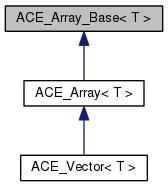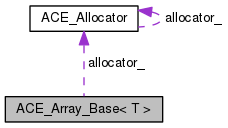|
ACE
6.2.2
|
|
ACE
6.2.2
|
Implement a simple dynamic array. More...
#include <Array_Base.h>


Public Types | |
| typedef T | TYPE |
| typedef ACE_Array_Iterator< T > | ITERATOR |
| typedef T | value_type |
| typedef value_type * | iterator |
| typedef value_type const * | const_iterator |
| typedef value_type & | reference |
| typedef value_type const & | const_reference |
| typedef value_type * | pointer |
| typedef value_type const * | const_pointer |
| typedef ptrdiff_t | difference_type |
| typedef ACE_Allocator::size_type | size_type |
Public Member Functions | |
| ACE_DECLARE_STL_REVERSE_ITERATORS | ACE_Array_Base (size_type size=0, ACE_Allocator *the_allocator=0) |
| Dynamically create an uninitialized array. More... | |
| ACE_Array_Base (size_type size, T const &default_value, ACE_Allocator *the_allocator=0) | |
| Dynamically initialize the entire array to the default_value. More... | |
| ACE_Array_Base (ACE_Array_Base< T > const &s) | |
| void | operator= (ACE_Array_Base< T > const &s) |
| ~ACE_Array_Base (void) | |
| Clean up the array (e.g., delete dynamically allocated memory). More... | |
| T & | operator[] (size_type slot) |
| T const & | operator[] (size_type slot) const |
| int | set (T const &new_item, size_type slot) |
| int | get (T &item, size_type slot) const |
| size_type | size (void) const |
| Returns the <cur_size_> of the array. More... | |
| int | size (size_type new_size) |
| size_type | max_size (void) const |
| Returns the <max_size_> of the array. More... | |
| int | max_size (size_type new_size) |
| void | swap (ACE_Array_Base< T > &array) |
Forward Iterator Accessors | |
Forward iterator accessors. | |
| iterator | begin (void) |
| iterator | end (void) |
| const_iterator | begin (void) const |
| const_iterator | end (void) const |
Reverse Iterator Accessors | |
Reverse iterator accessors. | |
| reverse_iterator | rbegin (void) |
| reverse_iterator | rend (void) |
| const_reverse_iterator | rbegin (void) const |
| const_reverse_iterator | rend (void) const |
Protected Member Functions | |
| bool | in_range (size_type slot) const |
Protected Attributes | |
| size_type | max_size_ |
| size_type | cur_size_ |
| value_type * | array_ |
| Pointer to the array's storage buffer. More... | |
| ACE_Allocator * | allocator_ |
| Allocation strategy of the ACE_Array_Base. More... | |
Friends | |
| class | ACE_Array_Iterator< T > |
Implement a simple dynamic array.
This parametric class implements a simple dynamic array; resizing must be controlled by the user. No comparison or find operations are implemented.
| typedef value_type const* ACE_Array_Base< T >::const_iterator |
| typedef value_type const* ACE_Array_Base< T >::const_pointer |
| typedef value_type const& ACE_Array_Base< T >::const_reference |
| typedef ptrdiff_t ACE_Array_Base< T >::difference_type |
| typedef ACE_Array_Iterator<T> ACE_Array_Base< T >::ITERATOR |
| typedef value_type* ACE_Array_Base< T >::iterator |
| typedef value_type* ACE_Array_Base< T >::pointer |
| typedef value_type& ACE_Array_Base< T >::reference |
| typedef ACE_Allocator::size_type ACE_Array_Base< T >::size_type |
| typedef T ACE_Array_Base< T >::TYPE |
| typedef T ACE_Array_Base< T >::value_type |
| ACE_DECLARE_STL_REVERSE_ITERATORS ACE_Array_Base< T >::ACE_Array_Base | ( | size_type | size = 0, |
| ACE_Allocator * | the_allocator = 0 |
||
| ) |
Dynamically create an uninitialized array.
| ACE_Array_Base< T >::ACE_Array_Base | ( | size_type | size, |
| T const & | default_value, | ||
| ACE_Allocator * | the_allocator = 0 |
||
| ) |
Dynamically initialize the entire array to the default_value.
| ACE_Array_Base< T >::ACE_Array_Base | ( | ACE_Array_Base< T > const & | s | ) |
The copy constructor performs initialization by making an exact copy of the contents of parameter s, i.e., *this == s will return true.
|
inline |
Clean up the array (e.g., delete dynamically allocated memory).
|
inline |
|
inline |
|
inline |
|
inline |
| int ACE_Array_Base< T >::get | ( | T & | item, |
| size_type | slot | ||
| ) | const |
Get an item in the array at location slot. Returns -1 if slot is not in range, else returns 0. Note that this function copies the item. If you want to avoid the copy, you can use the const operator [], but then you'll be responsible for range checking.
|
inlineprotected |
Returns 1 if slot is within range, i.e., 0 >= slot < cur_size_, else returns 0.
|
inline |
Returns the <max_size_> of the array.
| int ACE_Array_Base< T >::max_size | ( | size_type | new_size | ) |
Changes the size of the array to match new_size. It copies the old contents into the new array. Return -1 on failure. It does not affect new_size
| void ACE_Array_Base< T >::operator= | ( | ACE_Array_Base< T > const & | s | ) |
Assignment operator performs an assignment by making an exact copy of the contents of parameter s, i.e., *this == s will return true. Note that if the <max_size_> of <array_> is >= than <s.max_size_> we can copy it without reallocating. However, if <max_size_> is < <s.max_size_> we must delete the <array_>, reallocate a new <array_>, and then copy the contents of <s>.
| T& ACE_Array_Base< T >::operator[] | ( | size_type | slot | ) |
Set item in the array at location slot. Doesn't perform range checking.
| T const& ACE_Array_Base< T >::operator[] | ( | size_type | slot | ) | const |
Get item in the array at location slot. Doesn't perform range checking.
|
inline |
|
inline |
|
inline |
|
inline |
| int ACE_Array_Base< T >::set | ( | T const & | new_item, |
| size_type | slot | ||
| ) |
Set an item in the array at location slot. Returns -1 if slot is not in range, else returns 0.
|
inline |
Returns the <cur_size_> of the array.
| int ACE_Array_Base< T >::size | ( | size_type | new_size | ) |
Changes the size of the array to match new_size. It copies the old contents into the new array. Return -1 on failure.
| void ACE_Array_Base< T >::swap | ( | ACE_Array_Base< T > & | array | ) |
Swap the contents of this array with the given array in an exception-safe manner.
|
friend |
|
protected |
Allocation strategy of the ACE_Array_Base.
|
protected |
Pointer to the array's storage buffer.
|
protected |
Current size of the array. This starts out being == to <max_size_>. However, if we are assigned a smaller array, then <cur_size_> will become less than <max_size_>. The purpose of keeping track of both sizes is to avoid reallocating memory if we don't have to.
|
protected |
Maximum size of the array, i.e., the total number of T elements in array_.
 1.8.3.1
1.8.3.1